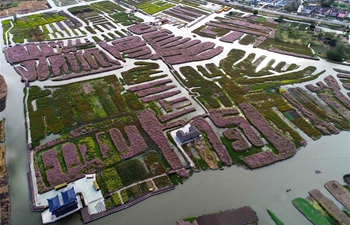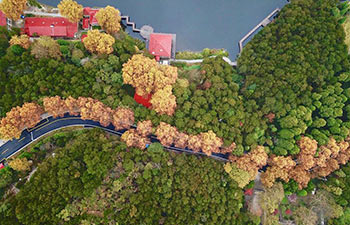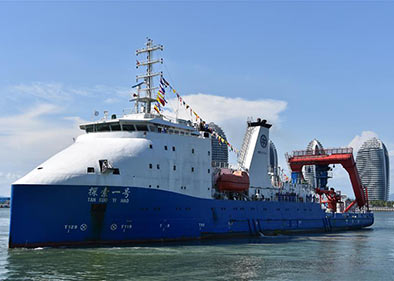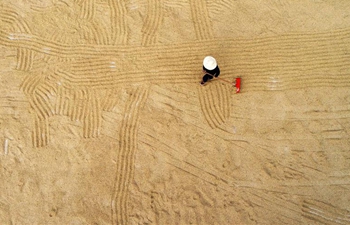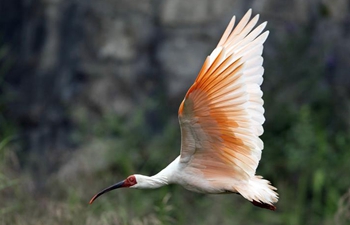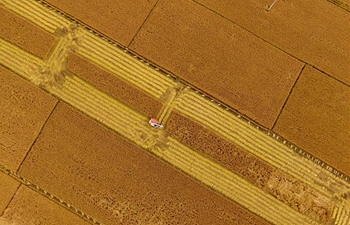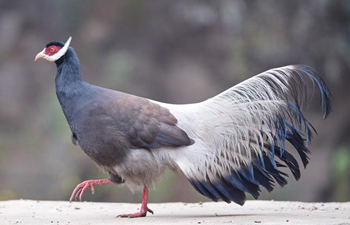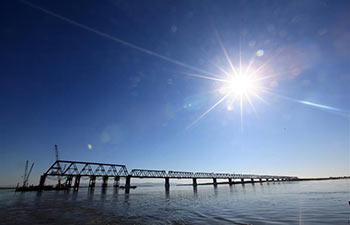
People harvest cotton in Sharqiya, Egypt, on Sept. 17, 2018. Egyptian farmers are harvesting long-staple cotton crop, which has a global reputation, with hopes of bountiful harvest and a good profit. TO GO WITH Feature: Egyptian farmers hopeful for profitable cotton season (Xinhua/Ahmed Gomaa)
by Ahmed Shafiq, Abdel-Maguid Kamal
SHARQIYA, Egypt, Oct. 20 (Xinhua) -- Egyptian farmers are now harvesting the long-staple cotton crop, which has a global reputation, with hopes of bountiful harvest and a good profit.
"I planted one hectare of cotton this year for the first time in four years, and I was encouraged by the fact that the government bought last year's harvest from the farmers," Abdelmutallab Salem, a farmer from Kafr Hamouda village in Sharqiya province, northeast of Cairo, told Xinhua.
Salem planted cotton before, but it was difficult to sell his crop.
"Cotton cultivation is expensive, and the cost of cultivating one hectare costs more than 10,000 Egyptian pounds (558.4 U.S. dollars)," Salem said, as he observed workers manually harvesting cotton. "Although costly, it is a profitable crop."
One hectare produces from 10 to 12 kantars, while the price of each kantar ranges from 2,500 to 2,700 pounds, Salem said.
Kantar, also known as qintar, equals either 157 kilograms of seed cotton or 50 kilograms of lint cotton.
Salem, who owns five hectares, is considering increasing the area planted with cotton to two or three hectares next season.
Egyptian cotton is an extraordinary commodity that has played an important role in Egypt's economic, social, and political history during the past two centuries.
Egypt's unique climate and fertile soil are ideal for cotton cultivation. From the early 18th century to the present, Egyptian cotton has always been synonymous with luxury and quality.
After the popular revolution in January 2011, the cotton industry in Egypt witnessed a recession because of government negligence, which degraded the quality of the most famous crop in the North African country.
However, the government has set plans to restore the key sector by doubling the production of high-quality cotton after years of suffering.
Meanwhile, Salem asked the government to support cotton farmers, adding that prices of fertilizers have skyrocketed.
"I also urge the government to increase the cotton prices it has set," he stressed.
At Salem's field, 60-year-old Subhi Ibrahim, a farmer from the same village, said it is important that the government buys the cotton crops from farmers, adding that cotton season is a good opportunity for him to increase his income.
Ibrahim, a father of seven, cultivates farms for others for half share of the crop at the end of the season.
"I work in cotton growing since I was a child. All my experience is in cotton growing," Ibrahim told Xinhua. "It is a good crop for both farmers and the land."
Abdul Aziz al-Samannoudi, head of the branch of Al-Kaan Company for Cotton Exports in Dakahlia Province, north of Cairo, said that cotton farmers face a problem after the government increased the area planted with the crop.
"The market price is less than the price set by the government which is 2,700 pounds per kantar," al-Samannoudi.
The cotton areas in Egypt this year amounted to 330,000 hectares, compared with 216,000 hectares last year and 131,000 hectares in 2016.
Egypt's cotton production this year is expected to reach 2.4 million kantar, compared to 1.4 million kantar last season and 700,000 kantars in 2016-2017, according to Egypt's Alexandria Cotton Association (ALCOTEXA).
According to ALCOTEXA, Egypt is expected to export around 65 million kilograms of long-staple cotton worth 150 million U.S. dollars in the 2018-2019 season.
The Egyptian long-cotton yield amounted to 55 million kilograms in the 2017-2018 season, 35 million kilograms in the 2016-2017 season and 30 million kilograms in the 2015-2016 season.
"After buying the cotton from farmers, we send the crop to cotton gins to separate seeds from cotton fibers, and then we pack cotton in bales for export or local spinners," al-Samannoudi explained.
He added that the seeds are sold to cotton seed oil-press to convert them into oil.
"Generally, growing cotton is very profitable for farmers, companies and the country's economy," al-Samannoudi said.
Egypt has been suffering an economic recession because of political instability and relevant security challenges following two uprisings that toppled two heads of state since 2011.
The turmoil led to a decline in the country's foreign currency reserves, foreign investments and tourism revenues.
In addition to floating its local currency to deal with dollar shortage, Egypt started in 2016 a strict three-year economic reform program, including austerity measures, fuel subsidy cuts and tax increase.


